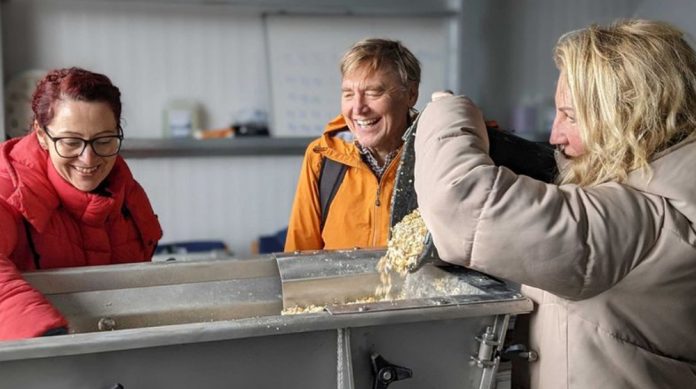The seaside town of Blackpool becomes UK’s first test site for a ‘groundbreaking’ sustainable, seashell concrete.
Seashells and concrete are converging to create a’ porous paradise’ in Blackpool, where a local arts company has become the UK’s first test site for a new, sustainable concrete.
The ongoing creep of urbanisation and climate change has led to more localised flooding around the country, most recently last Christmas.
As more natural green spaces are paved over, it becomes increasingly more important to consider how surface water is removed.
An obvious solution is to make urban environments more porous…
To achieve this, Professor Karl Williams and his team at the University of Central Lancashire (UCLan) have developed a sustainable, pervious concrete using whelks and scallop shells sourced at Fleetwood.
The university has joined forces with arts company LeftCoast to test the concrete at Bostonway Community Garden, in Blackpool, as an eco-friendly alternative to traditional concrete.
Tina Redford, LeftCoast’s Artistic Director, said: “I’m so proud that LeftCoast is able to support this innovative research, and offer the first UK test site for UCLan’s seashell concrete.
“Incorporating waste seashells into the mix means it acts like a sponge, slowly releasing water while saying ‘goodbye’ to impurities – improving water quality. Rainwater glides through the surface effortlessly, infiltrating groundwater bodies. This is a natural and clever technology that has worked successfully in France. Now we need to really test it and subject the concrete to the weather in Blackpool!”
The novel pervious concrete was developed as part of the three-year CIRCLE Project (an European Regional Development Interreg funded scheme).
For the unique research, UCLan partnered with Builders for Society École D’ingénieurs in Caen, France, to create the pervious seashell concrete, which can be used in urban settings such as footways and cycle paths and is already being used on the Velo 3 cycle route in the Somme region of France.
Nationally around 30,000 tonnes of waste shells go to landfill, each year, with the Northwest and Wales contributing 8,800 tonnes of cockles, scallop, and whelk shells (the equivalent of around 65 blue whales).
Recycling and reusing local waste seashells means less landfill and reduces extraction of natural resources from the earth.
UCLan’s mechanical and hydrological tests have proven that the pervious seashell concrete meets UK standards on strength and permeability. It also has a lower carbon footprint compared to conventional concrete and asphalt.
Professor Karl Williams said: “The idea behind the development of this product was to use local waste materials from the shellfish industry to make a pervious concrete for the built environment in flood-prone areas.
“It engages local communities, businesses, and government in finding local solutions to the challenges caused by climate change and the over-exploitation of the planet’s resources.”



